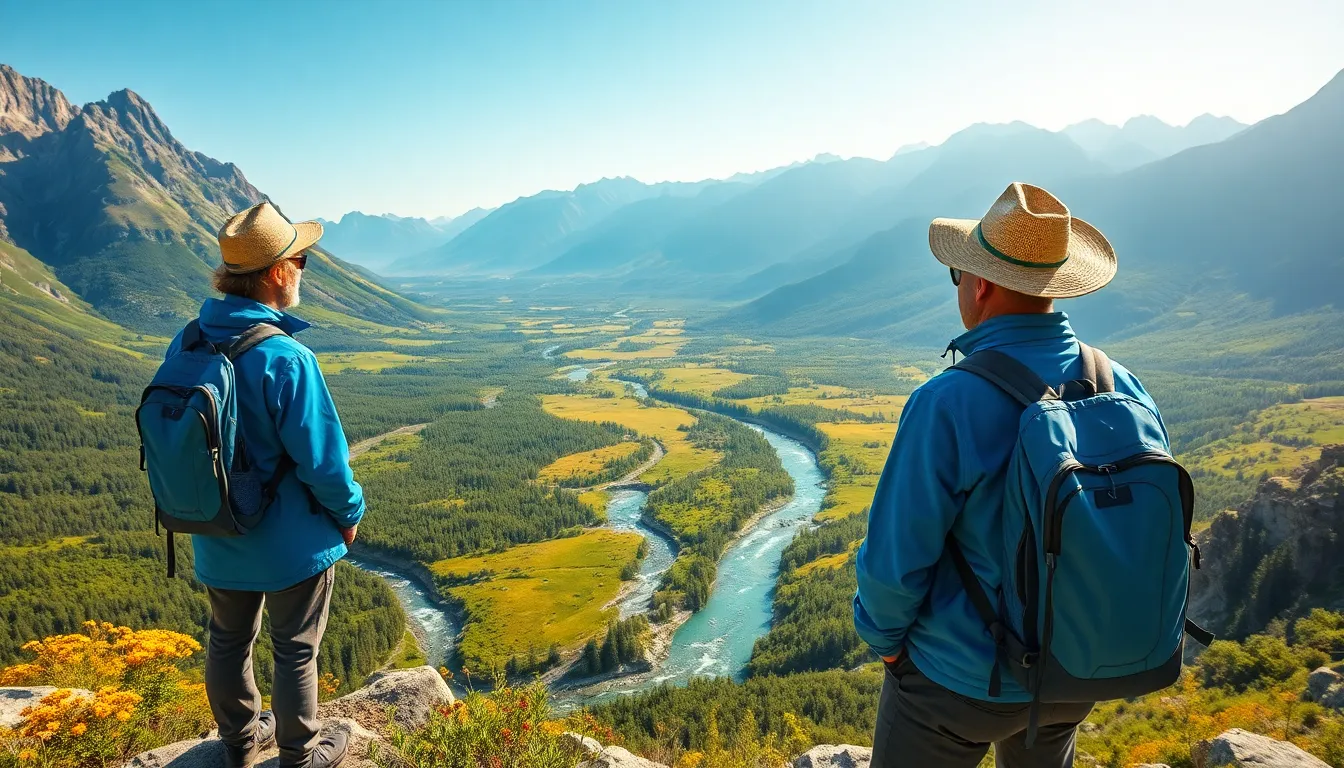Nature travel offers an exhilarating escape from the hustle and bustle of everyday life. It invites adventurers to immerse themselves in breathtaking landscapes, from lush forests to majestic mountains. Exploring the wonders of the great outdoors not only rejuvenates the spirit but also fosters a deeper appreciation for the environment.
In this nature travel guide, readers will discover essential tips and destinations that cater to every type of traveler. Whether it’s hiking through national parks or embarking on wildlife safaris, there’s something for everyone. With the right guidance, anyone can embark on a memorable journey that connects them to the beauty of nature.
Table of Contents
ToggleOverview of Nature Travel Guide
Nature travel serves as a means for individuals to reconnect with the environment while experiencing unique landscapes and diverse ecosystems. This guide offers practical insights into planning a successful nature-focused trip. It includes choosing suitable destinations, understanding local wildlife, and knowing the best times to visit various parks and reserves.
Key Elements of Nature Travel
- Destination Selection: Research popular spots such as national parks, wildlife reserves, and scenic trails. Each destination offers distinct experiences based on regional flora and fauna.
- Wildlife Observation: Learn about the best practices for safely observing animals in their natural habitats. Approaching wildlife responsibly can enhance the experience and protect local ecosystems.
- Seasonal Timing: Identify peak seasons for visits, factoring in climate conditions and wildlife activity. Optimal timing ensures better chances of engaging with nature in meaningful ways.
- Gear Preparation: Equip oneself with appropriate gear for hiking, camping, or wildlife photography. Quality gear enhances comfort and safety during nature adventures.
Benefits of Nature Travel
- Stress Relief: Immersion in nature reduces stress levels. Studies show that spending time outdoors can lower anxiety and promote mental well-being.
- Physical Fitness: Engaging in outdoor activities increases fitness levels. Hiking, biking, and kayaking contribute to overall health through cardiovascular exercise.
- Environmental Awareness: Nature travel fosters a deeper appreciation for conservation. Understanding local ecosystems encourages responsible habits and sustainable tourism.
Planning Your Adventure
- Research: Gather information about local environmental regulations, safety guidelines, and historical significance. Stay informed about preservation efforts to respect the environment.
- Travel Companions: Choose companions who share similar interests in nature exploration. Traveling with like-minded individuals enhances enjoyment and creates lasting memories.
- Respect Local Cultures: Embrace the customs of local communities encountered during travel. Engaging with locals enriches the experience and fosters respect.
By considering these aspects, travelers can embark on remarkable journeys that forge lasting connections with nature, while supporting conservation efforts and gaining enriching experiences.
Popular Destinations

Nature travel offers countless destinations that captivate adventurers. Two popular categories include national parks and remote wilderness areas.
National Parks
National parks provide diverse ecosystems, breathtaking landscapes, and well-marked trails, making them ideal for nature enthusiasts. Notable examples include:
- Yellowstone National Park: Famous for geothermal features, wildlife, and picturesque scenery.
- Yosemite National Park: Renowned for striking granite cliffs, waterfalls, and giant sequoias.
- Grand Canyon National Park: Offers stunning views of layered rock formations carved by the Colorado River.
These parks provide opportunities for hiking, camping, and wildlife observation while ensuring environmental preservation.
Remote Wilderness Areas
Remote wilderness areas deliver solitude and unspoiled beauty, attracting travelers seeking off-the-beaten-path experiences. Key locations include:
- Alaska’s Denali National Park: Home to North America’s highest peak, diverse wildlife, and vast tundra landscapes.
- Zion National Park in Utah: Features dramatic canyons and unique rock formations ideal for hiking and climbing.
- The Great Smoky Mountains: Offers tranquil forests, rich biodiversity, and scenic vistas.
These areas require careful planning and preparation, as amenities are limited and conditions can be challenging. Exploring remote wilderness promises rewarding adventures for those ready to embrace its wild charm.
Preparing for Your Trip
Preparation is key for a successful nature travel experience. Focus on selecting essential gear and prioritizing safety to ensure a rewarding adventure.
Essential Gear
Essential gear enhances the outdoor experience and maximizes comfort. Pack the following items for your trip:
- Backpack: A sturdy, weather-resistant backpack holds gear easily while distributing weight comfortably.
- Clothing: Layered clothing, including moisture-wicking base layers, insulating mid-layers, and waterproof outer shells, adapts to changing weather conditions.
- Footwear: Durable, supportive hiking boots provide traction and stability on uneven terrain.
- Navigation Tools: Maps, a compass, or a GPS device ensure accurate navigation through unfamiliar areas.
- First Aid Kit: A well-stocked first aid kit addresses minor injuries and illnesses during the trip.
- Water and Filtration: Carry a reliable water bottle and filtration system to stay hydrated and ensure safe drinking water.
- Camping Gear: If camping, include a sturdy tent, sleeping bag, and portable cooking equipment.
Safety Tips
Safety is crucial while exploring nature. Implement these safety tips to minimize risks:
- Know the Terrain: Research the area, including trails, elevation changes, and potential hazards, before starting the journey.
- Travel in Groups: Encourage traveling with a group to enhance safety and support.
- Inform Others: Share trip details with someone who stays behind, including expected return times and locations.
- Stay Alert: Remain aware of surroundings, particularly wildlife, weather changes, and trail conditions.
- First Aid Skills: Familiarize with basic first aid procedures to address emergencies effectively.
- Wildlife Awareness: Learn about local wildlife, including how to react to encounters and avoid attracting animals.
Implementing proper preparation and safety measures ensures a fulfilling nature travel experience.
Sustainable Travel Practices
Sustainable travel practices enhance nature travel experiences while protecting ecosystems and local cultures. Travelers can make conscious choices that contribute to the preservation of natural environments.
Leave No Trace Principles
Leave No Trace principles guide travelers in minimizing their environmental impact. These seven core principles include:
- Plan Ahead and Prepare: Research destinations, weather conditions, and necessary permits to ensure readiness for any adventure.
- Travel and Camp on Durable Surfaces: Stick to established trails and campsites to prevent soil erosion and protect vegetation.
- Dispose of Waste Properly: Pack out all trash, leftover food, and litter. Use designated bathroom facilities or bury waste at least 200 feet from water sources.
- Leave What You Find: Preserve cultural artifacts and natural features for future visitors. Don’t disturb wildlife or remove plants.
- Minimize Campfire Impact: Use a portable stove for cooking and stay within established fire rings if fires are permitted. Collect only downed wood for fires.
- Respect Wildlife: Observe animals from a distance and never feed them, as this disrupts their natural behaviors.
- Be Considerate of Other Visitors: Maintain noise levels, yield the trail to hikers, and share popular views to ensure all can enjoy the experience.
Supporting Local Communities
Supporting local communities strengthens the relationship between travelers and the natural areas they visit. Consider these practices:
- Choose Local Guides: Hiring local guides enriches the travel experience while providing economic benefits to the community.
- Purchase Local Products: Buying goods, crafts, and food from local artisans and farmers fosters economic growth and promotes cultural exchange.
- Participate in Community-Based Tourism: Engage in programs that offer immersive experiences, such as cultural workshops or conservation projects.
- Respect Local Cultures: Observe and honor the traditions, norms, and practices of local communities, promoting mutual respect and understanding.
- Contribute to Conservation Projects: Donate to or volunteer with organizations focused on preserving ecosystems and supporting wildlife.
Adopting sustainable travel practices fosters a deep connection with nature, encourages environmental stewardship, and enriches local communities.
Nature travel offers an unparalleled opportunity to reconnect with the environment while enjoying the beauty of the great outdoors. By following the guidance provided in this article, travelers can embark on adventures that not only enrich their lives but also promote conservation and respect for local cultures.
With careful planning and a commitment to sustainable practices, individuals can explore breathtaking landscapes and experience the wonders of wildlife. Embracing nature travel leads to personal growth and fosters a deeper appreciation for the world around us. Each journey into nature becomes a chance to create lasting memories and inspire others to appreciate and protect our planet.





